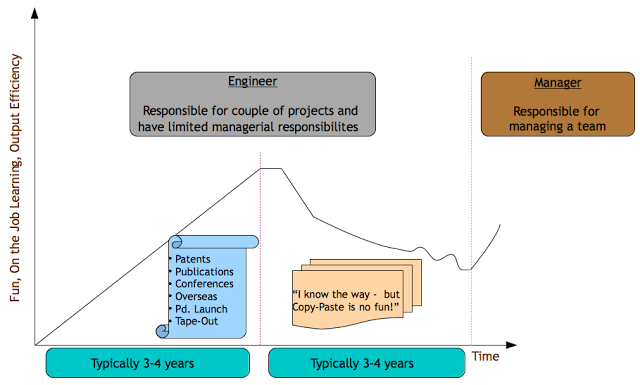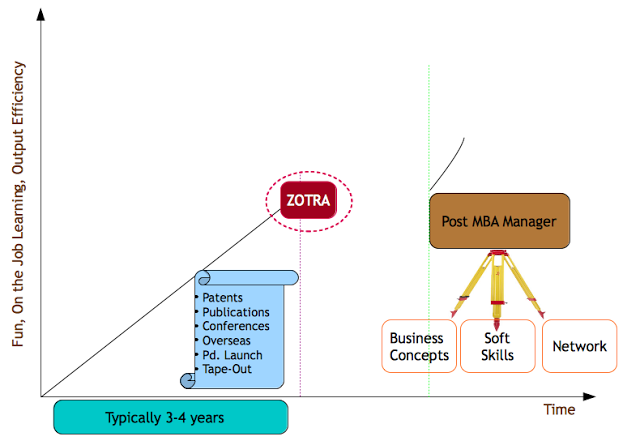|
About This Page
This page is to share blogs/articles written by our members. Members wishing to share their blogs here, please write to us. Archives
August 2018
Categories |
Back to Blog
By Pankaj Agrawal Yes, I highly recommend that engineers get an MBA. The top three reasons I can think of are the following -
However, the timing of an MBA is critical to make sure that you transition to a “business professional career” only after having had the best from your engineering career. Let's look at a typical engineer's career profile as shown below. Like other professionals, engineers are also motivated to perform on their first job. There is a significant level of satisfaction and fun given the huge on-the-job learning opportunities coupled with prompt recongition from the immediate supervisors. In my case, my boss applauded me for consistently coming out with lots of innovative ideas. I filed multiple patents every year and also created many hardware prototypes (read proof-of-concepts) from scratch. However, in a couple of years the exuberation begins to fade. The job becomes less interesting and sometimes also very redundant. Most of what you do becomes like doing a solved problem albeit in a slightly different context. If you just sit on your job for a couple of years (doing nothing extra-ordinary), your company will promote you to lead a team of engineers. That is indeed a good news, but then the question is – Are you prepared to handle the responsibility (designing (hiring/ firing) the team and setting up team interaction processes to create a good team dynamics, motivating the team, communicating with cross-functional team managers and also with the top management and much more) of a manager? Do you have the right set of skills and credibility to match your new job? A newly promoted manager gets just a few weeks of training from the company which is mostly spent “celebrating” the new job and higher pay check. Perhaps at that point, you feel the need for a more formal and extended duration of business management education but then it's too late to explore. Now, the obvious question pops up - When is then the right time to pursue a management degree? I have identified a ZOTRA (Zone Of TRAnsition - please see the image below) in a typical engineer's career profile. Every engineer should be aware of his ZOTRA and plan to leave for an MBA after he has delivered a “stellar” performance for around 3-4 years. Most engineers (including me) tend to totally disregard/ignore their ZOTRA due to peer pressure, influence from the boss, internal resistance to shift from the comfort zone and so on and so forth. However, this time (once you are in ZOTRA) is right because of many reasons – your confidence level is high and are motivated to achieve more, you can get good recommendations from your mentors/bosses, you have “fresh” stories to write in your business school application and your age is very close to the median age range of prospective business school students/applicants. Immediately after your MBA, you would most likely assume the title of a manager/senior manager. However, unlike a manager without an MBA, you would have a solid tripod pedestal (business concepts, soft skills and solid network) that will assist in making you a great manager.
0 Comments
Read More
Leave a Reply. |
Site developed for IITAAK.


